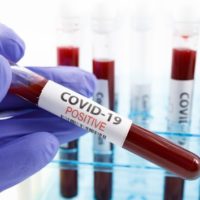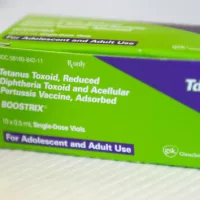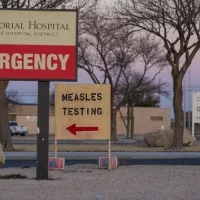
(NEW YORK) — As the rate of COVID-19 vaccinations accelerates, millions of Americans are planning for life after the pandemic. But for people with lingering symptoms — patients known as “long haulers” — that day may never come.
Now, clinics are springing up across the country with a mandate to study the long-term impacts of COVID-19 and treat people who suffer from symptoms that include memory loss, overwhelming fatigue, and difficulty breathing.
The creation of clinics devoted entirely to helping those who have not fully recovered from COVID-19 is likely to become one of the enduring legacies of a disease that’s killed more than half a million people in the U.S.
“While I’m very hopeful that the number of ‘Long COVID’ patients decreases dramatically over time, I do expect that there will be a smaller subset of people that continues to have some lingering issues over the next few years,” Benjamin Abramoff, director of Penn Medicine’s Post-COVID Assessment and Recovery Clinic, told ABC News.
Dr. Georgia Lea, a neurologist who lives in New Orleans, counts herself among the unlucky Americans who suffer from lingering symptoms of the virus.
In June of last year, Dr. Lea started feeling the symptoms of COVID-19 exposure. So she took what she believed would be a short break from her busy hospital practice.
A few weeks later, Dr. Lea tried to return to work, and even started seeing patients via telemedicine.
“I thought I should be better,” she said.
But instead, she found herself overwhelmed by fatigue.
“It was becoming very difficult to see patients and do charting, and stay awake,” she said.
Dr. Lea’s condition is not unique. While the majority of people fully recover after contracting COVID-19, studies indicate that up to a third of people who test positive for COVID-19 may develop Long COVID.
According to the National Institutes of Health (NIH), the symptoms of Long COVID, which the NIH calls “Post-Acute Sequelae of SARS-CoV-2 infection,” or PASC, can vary. PASC is not a “syndrome,” which indicates a collection of symptoms or physical findings due to a single disease, says Dr. Jerry Krishnan, a pulmonologist at the University of Illinois Hospital & Health Sciences System in Chicago.
“PASC is most likely several different diseases, depending on the type of virus that caused COVID, our body’s ability to fight the infection, and the social determinants of health,” Dr. Krishnan told ABC News.
The social determinants of health — the conditions under which people are born, grow, live, work and age — can affect health outcomes, he said.
Symptoms of Long COVID often include fatigue, shortness of breath, brain fog, sleep disorders, fevers, gastrointestinal symptoms, anxiety and depression. Sometimes the symptoms are mild; in other cases, as Dr. Lea discovered, they can be incapacitating.
Dr. Sritha Rajupet, a preventive and family medicine physician who helps lead the Post-COVID Clinic at Stony Brook Medicine, said that of the approximately 30 million people in the U.S. who have had COVID-19, between three and nine million of them will go on to have persistent symptoms. With this in mind, Congress in December allocated $1.15 billion to support the study of Long COVID.
But the results of that research are far off, and in the meantime, the U.S. health system is being forced to pivot.
“We need to be thinking about how our health systems will begin to care for these individuals and the additional resources we will need to support those who have had an exacerbation of their underlying medical conditions since having COVID,” said Rajupet.
Rajupet said that from her experience, treating people with Long COVID can be both complicated and costly.
“We have been seeing higher rates of depression, anxiety and PTSD in COVID long haulers,” she said. “Access to mental health services is essential in supporting their recovery.”
Humboldt Park Health, a health system based in Chicago, recently set up a post-COVID clinic specifically to address the Long COVID needs of the low-income communities it serves.
“As the long term effects of COVID-19, known as post-COVID or Long COVID, become more apparent, these communities will likely bear the greater burden of Long COVID as well,” said Chief Medical Officer Dr. Abha Agrawal.
Another concern is whether employers will continue to provide health coverage to employees who can’t work due to their Long COVID symptoms — especially since about half of Americans get their health insurance from their employer. Experts told ABC News they’re especially concerned about young people who are now suffering from Long COVID, because scientists don’t know what the long-term effects will be.
Some experts believe that Long COVID could lead to a rash of disability claims, and many employers are still trying to figure out whether chronic COVID-19 symptoms should qualify for disability.
Complicating these questions is the nature of Long COVID symptoms which, according to the NIH, sometimes arise well after the time of infection — and can even change over time.
“In order to ensure that people have access to the health resources they need to regain the vitality of their pre-COVID lives, it’s essential that insurers work together with employers and health officials to better understand this syndrome and the true cost of treating it,” said Dr. Sachin Jain, president and CEO of SCAN Health Plan, a Medicare Advantage insurer.
In New Orleans, Dr. Lea has stopped working — though her employer continues to pay her salary and maintain her health benefits. She says that some days she has 50% of her normal energy, but on others it drops to just 20%.
Other symptoms are harder to quantify. Dr. Lea said she used to enjoy a glass of wine with dinner, but now just one sip leaves her “confused, tired and thick-headed.” However some experts, like Dr. Abramoff, caution against studying this kind of association.
Dr. Rajupet said people suffering from Long COVID symptoms shouldn’t give up hope, as treatments are constantly evolving. Health care providers, for example, are learning to help people reverse their loss of smell, which is a common symptom of COVID-19, she said.
Dr. Lea, however, didn’t sound so hopeful.
“In hindsight, I should have taken more time off to be fully rested” after initially contracting the virus, she said. “[But] I don’t know if it would have made a difference.”
Copyright © 2021, ABC Audio. All rights reserved.













